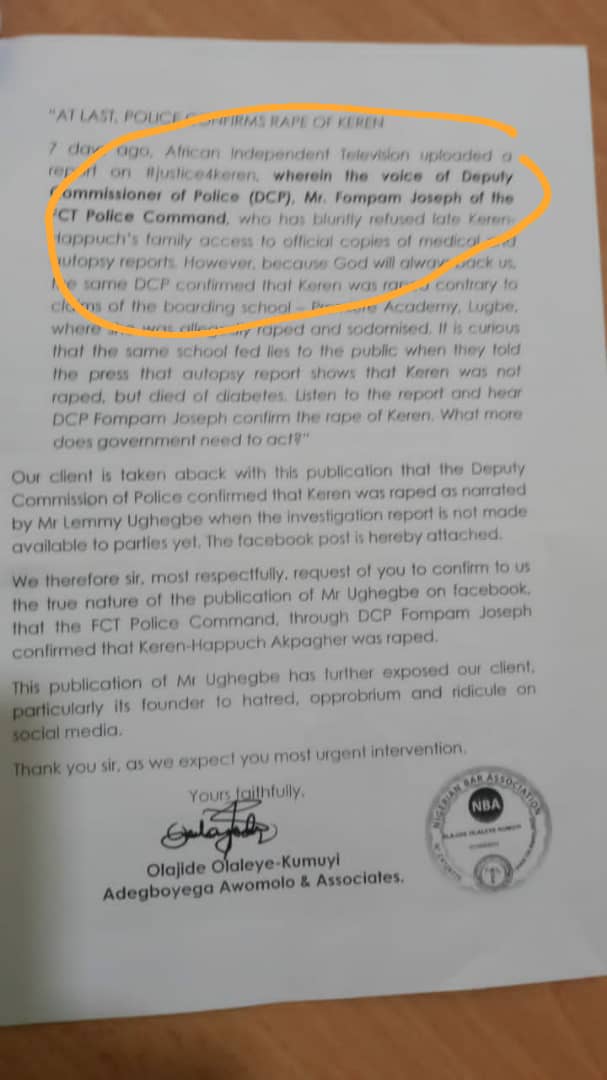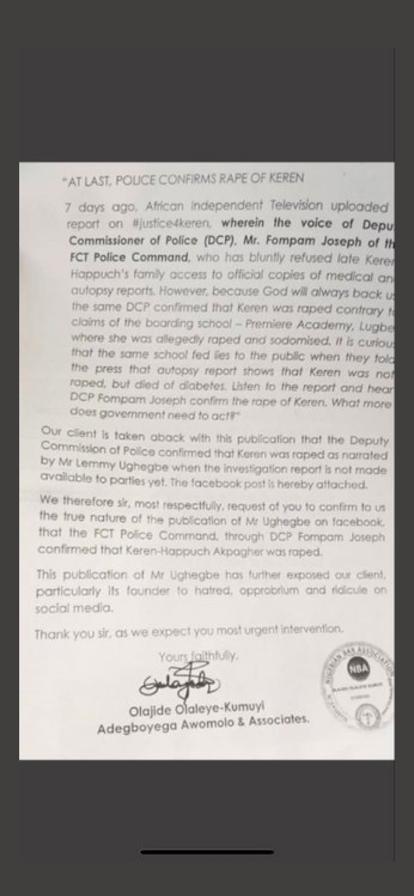Feature/OPED
Karen Akpagher and Premiere Academy: The “Truth” They Are Trying to Bury

By Noah Christopher
Nearly six months ago, Premiere Academy entered the media spotlight when news broke that one of its students, Karen Happuch Akpagher, had died in a hospital in Abuja.
The news of the death of the 14-year old diabetics’ patient which occurred on 22nd June 2021 soon became a hot issue as several media stories authoritatively claimed she was raped to death, sodomized and forced into an oath of secrecy to booth.
Expectedly, the Nigeria Police Force, first through the FCT Police Command and, later, the Office of the Inspector General of Police, promptly commenced investigations into the matter same June, leading to an autopsy conducted in July.
Several other government agencies such as the Ministry of Education, the Directorate of Quality Assurance, the National Human Rights Commission and a few other external bodies also waded into the case by conducting probes and investigations on diverse scales and to cover different angles.
The Premiere Academy PTA and Board also conducted internal investigations. However, despite all the probes, the answer to the key question of Who/What killed Karen has not been found. Interestingly, none of these probes has indicted the school or led to halting its operation.
Perhaps, tired of waiting for official police reports on the autopsy and investigation and seeking to prevent the issue from being swept into silence, Lemmy Ughegbe, an Abuja based journalist, human rights activist and school proprietor instantly activated his NGO, Coalition of Gender-Based Violence Responders, to promote the cause of championing justice for Karen Akpagher.
With Karen’s mother by his side, Lemmy Ughegbe and GBV Responders have launched coordinated multi-pronged advocacy spanning media and political institutions, with the aim of getting the death of Karen hanged on Premiere Academy.
The evidence, according to the media interventions by the group, is a report allegedly issued to the Akpagher family by Queen’s Hospital, Abuja that said decomposed condom particles were found in the late teenager’s genital, in addition to dead spermatozoa.
No audio or video recording of the victim accusing the school or any staff of raping or sexually molesting her; no notation on rape or sexual molestation in the victim’s diary (from which a few media stories have lifted entries); no conclusive report from the autopsy witnessed by all parties and supervised by the police; no report from the police or any private investigator has surfaced to back the claim of rape to date.
Perverting Cause of Justice…
In what appears like frustration by a failure of the coordinated campaign to nudge the relevant state and non-state institutions into a mob-styled condemnation of the school, the GBV Responders has further accused the school of blocking the Akpagher family from getting justice.
The coordinated social media campaign to push this viewpoint claimed because the owner of the school is a highly connected Nigerian, he was using his connection to obstruct justice for Karen.
However, to accuse a school that has opened its doors to and provided its officials for not less than 16 investigations, invitations, probes and interviews on this Karen matter by several interested bodies from June 25th to December 9th of persecuting the cause of justice seems unfair.
Curiously, a check at the school revealed that the GBV Responders that has been championing this claim was one of the NGOs that visited the school on July 3rd to conduct an investigation.
Others that have also visited the school, apart from the Police, include the Federal Competition & Consumer Protection Council (2nd July), Directorate of Quality Assurance, FCT Headquarters (2nd July), NAPPS, FCT Chapter (9th July), Abuja Municipal Area Council (9th July), Federal Ministry of Education (8th October), Association of Nigerian Female Students, FCT Chapter (22nd July), NANS, FCT Chapter (22nd July) and FCIID (Severally between 9th November and 9th December).
None of the visitors has accused the school of non-cooperation or obstructing investigation. This may be what has prompted the school to continue to declare that it has nothing to hide and would always welcome every noble effort made to get to the bottom of this sad event.
In trying to prove its innocence and disprove the charge of perverting the cause of justice, the school said it has written three letters to the police pleading for the public release of the autopsy report and report of investigation in the case.
From copies sighted, the first letter dated 27th August, 2021 was addressed to the FCT Police Command while two other letters dated 1st December, 2021 and 6th December, 2021 respectively were addressed to the Inspector General of Police. While the police acknowledged receipt of the three letters, it has not responded to any of them or granted the school’s prayer. It is doubtful if the school’s action fits the charge of obstructing the cause of justice
Twisting The Story To Fit A Purpose…
It appears in order to get the school hanged for the allegation of rape, efforts had to be made to show that Karen left the school premises on the 19th June in “serious pains and barely able to walk” (to quote a respected columnist and social commentator who has weighed in on the matter) when she went home, never to return to the school.
Facts are sacred. So, here are a few incontrovertible facts our investigation turned up on how Karen left the school campus on the fateful day.
First, she was picked from school by her mother in person (together with an uncle of hers who had always been coming to pick and drop her on the mother’s instruction). She walked out of the school gate unaided, carrying her luggage to meet her mother. Her mother received her; they rode in the same vehicle and was taken home by her mother.
It is doubtful that if she was in pain and unable to walk or manifesting any sign of unwellness, the mother would not make immediate contact with the school and/or take her straight to the hospital. But, the mother drove with her from the school without any complaint and they went home together.
Moreover, she was at home with the mother from 19th to 21st when the mother said she developed a health crisis that made her to be taken to the hospital IMMEDIATELY on the 21st.
School’s CCTV clips on YouTube (https://youtu.be/hqOa2jg_Ym8) shows Karen in school from 17th June to the moment she exited school on the 19th. Before leaving school, she went to see an ophthalmologist outside the school, on the mother’s instruction, same 19th June. School’s academic record also shows she wrote CA tests on Friday, 18th June.
Could a 14-year old have been so superhuman to hide her pains effortlessly and appear bubbly while undertaking all the multiple tasks that filled her day in the manner the late Karen did?
The late Karen, it should be recalled, was a Diabetics’ patient constantly under strict health watch. She had been diagnosed to be diabetic since age nine years.
DNA as a Way Pointer…
The House of Representatives has directed that a DNA test be conducted on all male staff of Premiere Academy, to fish out the alleged rape culprit. While the directive is commendable, our investigation shows that there is a need to even cast the net wider in view of certain peculiarities uncovered about the Akpagher family environment.
For instance, it was discovered that Karen has two elder brothers who were also students of the same Premiere Academy with her. While one graduated in 2020, the other was still a student in the school until after the unfortunate event.
She also has a custodian uncle who, it was discovered, was always going to pick and drop her in school. Unconfirmed report said this uncle organised a birthday party for Karen and some of her friends in a restaurant in town on April 10th to mark her 14th birthday. The uncle, it was further learnt, took her to the party.
It was also learnt that the same uncle picked only Karen from school during the id-el-Fitri break on 12th May while leaving his brother behind to observe the break in school. This, from the investigation, was found to be a departure from the regular practice of picking and dropping both students together.
Upon further probe, it was discovered that while the said Salah break was meant to end on 16th May, Karen was only returned to the school by her uncle on 23rd May, clear 7 days after the resumption.
She was to die one month later; allegedly from a rape incident whose features, according to her mother and GBV Responders, left decayed condom particles in her genitals.
With the late Karen surrounded by two brothers who have their other male friends visiting the Akpagher home as well as an uncle who was found to have been mostly responsible for picking and dropping her in school, it is only fair and commonsensical to look way beyond the school in order to unravel the question of who could have raped the teenager, if indeed she was raped.
Justice Begins With Disclosures…
For justice to be done and seen to be done in the case of Karen Akpagher, the police need to release the autopsy and investigations reports. So many questions begging for answers may remain unresolved until the police reports are released.
According to a cross-section of analysts’ opinion, all parties in the case – the Akpagher family, GBV Responders and Premiere Academy – should jointly and individually put pressure on the police to do the needful rather than continue to throw mud around and promote wild, unfounded accusations, unless the mud throwing is designed to achieve an end that the larger public does not yet know.




Feature/OPED
The Hidden Workforce of the 2026 Access Bank Lagos City Marathon

When the final runner crossed the finish line at the 11th edition of the Access Bank Lagos City Marathon (ABLCM), the applause began to fade. But for hundreds of workers across Lagos, the real work was just beginning.
Major highways had been closed to facilitate the event. Tens of thousands of runners moved through the city in a coordinated surge of athletic endurance. Thousands of bottles of water and energy drinks were distributed, alongside sachets containing essential medical supplies and medication. The race route itself was meticulously prepared, lined with banners, barricades, medical tents and precision timing systems that ensured safety, organisation and accurate performance tracking from start to finish.
What followed was the part that a few cameras lingered on, yet it remains one of the clearest indicators of institutional progress.
Within minutes of the race conclusion, coordinated sanitation teams fanned out across the marathon corridor. Their work went beyond sweeping. Waste was systematically sorted. Plastic bottles were separated from general refuse. Sachets were gathered in bulk. Collection trucks moved along predefined routes, ensuring rapid evacuation of waste. Temporary race infrastructure was dismantled with quiet precision.
In a megacity like Lagos, speed is a necessity. Urban momentum cannot pause for long. The ability to restore order quickly after an event of this magnitude reflects operational discipline across interconnected systems, municipal authorities, environmental agencies, private waste management partners and event coordinators.
Globally, large-scale sporting events are no longer evaluated solely by participation numbers or prize purses. Sustainability has emerged as a defining metric. Environmental responsiveness is now a core measure of credibility. Cities seeking tourism growth, foreign investment and international partnerships must demonstrate that scale does not compromise responsibility. The 2026 marathon provided a compelling case study in this evolution.
The clean-up operation itself generated meaningful economic activity. Temporary employment opportunities emerged for sanitation workers and logistics personnel. Recycling partners engaged in material recovery, reinforcing circular economy value chains. What was once viewed as routine waste disposal has evolved into a structured ecosystem of environmental services, a sector of increasing importance in modern urban economies.
This level of sustainability was the result of deliberate planning. Effective post-event recovery requires route mapping, waste volume projections, coordination between sponsors such as Access Bank Plc and municipal bodies, contingency planning for congestion points and clear communication protocols.
Each edition of the marathon has built on lessons from the last. International participation has expanded. Accreditation standards have strengthened. Media visibility has grown. Most importantly, environmental management has become embedded in the marathon’s operational framework rather than treated as an afterthought.
Progress rarely arrives in dramatic leaps, it advances through incremental improvements, refined systems and institutional learning. Just as elite runners close performance gaps through disciplined training, cities strengthen their global standing through consistent operational excellence.
The 2026 marathon, therefore, tells a story that extends far beyond athletic achievement. It is a story of coordination, sustainability as strategy rather than slogan, and the often unseen workforce, sanitation workers, planners, volunteers, security officials and environmental partners, whose discipline sustains the spectacle.
Because in the end, global cities are judged by how well they host and how responsibly they restore. On the marathon day in Lagos, it was the runners who demonstrated endurance and the systems, and the people behind them, who ensured that when the cheering stopped, the city kept moving.
Feature/OPED
N328.5bn Billing: How Political Patronage Built Lagos’ Agbero Shadow Tax Empire

By Blaise Udunze
Lagos prides itself as Africa’s commercial nerve centre. It markets innovation, fintech unicorns, rail lines, blue-water ferries, and billion-dollar real estate. Though with the glittering skyline and megacity ambition lies a parallel state, a shadow taxation regime run not from Alausa, but from motor parks, bus stops, and highway shoulders. They are called “agberos.” And for decades, they have functioned as Lagos’ unofficial tax masters.
What began as loosely organised transport unionism mutated into a pervasive and often violent system of extortion. Today, tens of thousands of commercial buses, over 75,000 danfos according to estimates by the Lagos Metropolitan Area Transport Authority, ply Lagos roads daily. Each bus is a moving ATM. Each stop is a tollgate. Each route is a revenue corridor.
Looking at the daily estimate from their operations, at N7,000 to N12,000 per bus per day, conservative calculations show that between N525 million and N900 million is extracted daily from drivers. Annually, that balloons toward N192 billion to N328.5 billion or more, money collected in cash, unreceipted, unaudited, unaccounted for. This illicit taxation on an industrial scale did not emerge in a vacuum.
The reality today is that to understand the scale of the problem, one must confront its political history. It was during the administration of Bola Ahmed Tinubu as Lagos State governor from 1999 to 2007, who is now the President, that the entrenchment of transport union dominance and motor park patronage deepened.
Under his political machine, transport unions became not just labour associations but mobilisation structures, formidable grassroots networks capable of crowd control, voter turnout engineering, and territorial enforcement. In exchange for political loyalty, street influence translated into operational latitude.
Motor parks became power bases. “Area boys” became enforcers. Union leadership became politically connected. What should have been regulated associations morphed into revenue-generating franchises with muscle.
The system outlived his tenure. It institutionalised itself. It professionalised. It is embedded in Lagos’ political economy.
And today, it thrives in broad daylight. Endeavour to visit Ajah under bridge, Ikeja under bridge, or Mile-2 along Ojo at 6:00 a.m. Watch drivers clutching crumpled naira notes. Observe men in green trousers and caps marked NURTW weaving between buses, collecting what drivers call òwò àrò, or evening as òwò iròlè money taken from passengers.
A korope driver shouts, “Berger straight!” His bus fills. The engines rumble. But before he moves, he must pay. If he refuses? The side mirror may disappear. The windscreen may crack. The conductor may be assaulted. The vehicle may be blocked with planks, and if they resist, the conductor or driver may be beaten. Movement becomes impossible. It is not optional.
This is common across Lagos, especially amongst drivers in Oshodi, Obalende, Ojodu Berger, Mile 2, Iyana Iba, and Badagry, and describes a three-layered structure ranging from street collectors, area coordinators, and union executives at each location. Daily targets flow upward. Commissions remain below.
One conductor disclosed he budgets at N8,500 daily for louts alone, excluding fuel, delivery to vehicle owners, and official tickets. Another driver says he parts with nearly N15,000 in total daily levies across routes.
Of N40,000 collected on trips, barely N22,000 survives before fuel. Sometimes, drivers go home with N3,500. Working like elephants. Eating like ants. The impact extends far beyond drivers.
Every naira extorted is transferred to commuters. An N700 fare becomes N1,500. A N400 corridor becomes N1,200 in traffic, and this is maintained even after fuel prices fall; fares rarely decline. The hidden levy remains.
Retail traders reduce stock purchases because transport eats profits. Civil servants watch salaries stagnate while commuting costs climb. Market women complain that surviving Lagos costs more than living in it.
This is not just a transport disorder. It is inflation engineered by coercion. Economists call it financial leakage, money extracted from the productive economy that never enters the fiscal system. Billions circulate annually without appearing in government ledgers. No roads are built from it. No hospitals funded. No schools renovated.
It is taxation without development. Small and Medium Enterprises form nearly half of Nigeria’s GDP and employ the majority of its workforce. In Lagos, they are under assault from informal levies layered on top of official taxes. Goods delivered by bus carry hidden transport premiums. Commuting staff face higher daily costs. Inflation ripples through supply chains.
The strike by commercial drivers in 2022 exposed the depth of resentment. Under the Joint Drivers’ Welfare Association of Nigeria (JDWAN), drivers protested “unfettered and violent extortion.” Lagos stood still. Commuters trekked. Appointments were missed. Businesses stalled.
Drivers alleged that half of their daily income vanished into motor park collections.
Some who protested were attacked. Yet the collections continued.
Drivers insist daily collections at single corridors can exceed N5 million. Park chairmen allegedly control enormous cash flows. Uniformed collectors operate with visible confidence.
Meanwhile, the Lagos State Government denies sanctioning any roadside extortion. Officials describe the tax system as institutionalised and structured. They promise reforms through Bus Rapid Transit, rail expansion and corridor standardisation. Yet the shadow toll persists.
Contrast this with Enugu State, where Governor Peter Mbah introduced a Unified e-Ticket Scheme mandating digital payments directly into the state treasury. Paper tickets were banned. Cash collections outlawed. Revenue flows are traceable. Harassment criminalised.
Drivers in Lagos say openly that they should be given a single N5,000 daily ticket paid directly to the government, and end the chaos. Instead, they face multiple actors, agberos, task forces, and traffic officials, each demanding settlement.
The difference is in governance philosophy. One digitises and centralises revenue to eliminate leakages.
The other tolerates fragmentation that breeds shadow collectors. The uncomfortable truth is that the agbero structure is politically sensitive. Transport unions are not just labour bodies; they are political instruments. They mobilise during elections. They maintain territorial presence. They command street loyalty. In return, they are allegedly tolerated, protected, or absorbed into broader political structures as they turn into war instruments and a battle axe in the hands of the government of the day. The underlying reality is that the agbero who are the street-level power structures and the government authorities benefit from each other; the line between unofficial influence and official governance becomes unclear, making reform politically sensitive.
The issue is not merely about street disorder; it is about economic governance. Illicit taxation distorts pricing mechanisms, reduces productivity, discourages the formalisation of businesses, and weakens public trust. If citizens are compelled to pay both official taxes and unofficial levies, compliance morale declines. Why comply with statutory taxation when parallel systems operate unchecked?
Dismantling them is not merely administrative; it is political. Perhaps unbeknownst to the people, the cost of inaction is immense. Lagos aspires to be a 21st-century smart megacity under such an atmosphere. But investors notice informal roadblocks. Businesses factor in unpredictability. Commuters absorb unofficial taxes daily. Across Lagos roads, the script repeats “òwò mi dà,” meaning, give me my money.
Passengers plead with collectors to reduce levies so they can proceed. Conductors argue over dues before departure. Citizens feel hostage to a system they neither elected nor authorised.
Taxation, constitutionally, belongs to the state. It must be legislated, receipted, audited and deployed for the public good.
Agbero taxation is none of these. It is coercive. It is not transparent. It is extractive. Lagos has launched rail lines and BRT corridors. The Lagos Metropolitan Area Transport Authority continues transport reforms. Officials promise that bus reform initiatives will eliminate unregistered operators. But reform cannot be selective. You cannot modernise rail while medieval tolling persists on roads. You cannot preach digital governance while cash collectors flourish at bus stops. You cannot aspire to global city status while informal muscle dictates movement.
The solution is not episodic arrests. It is a structural overhaul: mandatory digital ticketing across all parks; a single harmonised levy payable electronically; an independent audit of union revenue; protection for drivers who resist illegal collections; and political decoupling of unions from patronage networks.
The agbero empire is not merely about bus fares. It is about how patronage systems, once empowered, metastasise into parallel authorities. What may have begun as strategic alliance-building two decades ago has matured into a shadow fiscal regime embedded in daily life.
The challenge is that Lagosians are left with no choice as they now pay twice, once to the government, once to the streets. And unlike official taxes, shadow taxes leave no developmental footprint. No bridge bears their name. No hospital wing testifies to their billions. No classroom is built from their collections. Only inflated fares. Broken windscreens. Frustrated commuters. And drivers who sweat under the sun, calculating how much will remain after everyone has taken their cut.
The agbero question is ultimately a governance question. Is Lagos governed by law, or by tolerated coercion? Is taxation a constitutional function, or a roadside negotiation? Is political convenience worth permanent economic distortion? What is absolutely known is that the structure has a political backing and what politics created, politics can dismantle.
Unless meaningful reform takes place, Lagos will continue to remain a megacity with a shadow treasury, where movement begins not with ignition, but with payment to men who answer to no ledger without any tangible returns. This is to say that every danfo that moves carries not just passengers, but the weight of a system that taxes without law, collects without accountability and punishes the very people who keep the city alive.
Blaise, a journalist and PR professional, writes from Lagos and can be reached via: bl***********@***il.com
Feature/OPED
How to Nurture Your Faith During Ramadan

Many Muslims grow up learning how to balance life carefully. Faith, work, and responsibility all sit on the same scale, and during Ramadan, that balance becomes even more delicate. Days start earlier than usual, nights stretch longer, and energy is spent with intention.
Over time, this rhythm shapes more than schedules; it quietly shapes how Ramadan is experienced.
Between getting ready for work, navigating long days, preparing meals for iftar, observing prayers, and trying to rest, moments for reflection are often pushed to the side. When there’s finally time to pause, many people assume meaningful Islamic content requires complete silence, full attention, and emotional space, things that can feel scarce during the month.
They scroll past channels they believe may be too formal, or not suited to their everyday routine. They stick to what feels familiar, even if it doesn’t quite align with the spirit of the season and without realising it, they limit themselves.
What many don’t know is that content designed for moments like these already exists on GOtv. The Islam Channel offers programming that understands Ramadan as it is truly lived.
On the Islam Channel, viewers can find thoughtful discussions that explore faith in a way that feels relevant to modern life, educational programmes that break down Islamic teachings clearly and calmly, and inspiring shows that encourage reflection without feeling overwhelming. There are conversations that can play softly in the background while you’re cooking, reminders you can catch while getting dressed for work, and programmes that help you unwind gently after a long day of fasting.
What sets the channel apart is how it personalises Islamic themes, making them accessible not just during prayer time, but throughout the day. Its content is created to inform, reflect, and inspire, whether you’re actively watching or simply listening as life continues around you. And while it speaks directly to Muslim audiences, it also remains open and welcoming to non-Muslims interested in understanding Islamic values, culture, and everyday perspectives.
During Ramadan, television often becomes part of the atmosphere rather than the focus. And having access to content that aligns with the season can quietly enrich those in-between moments, the ones that often matter most.
This Ramadan, the Islam Channel is available on GOtv Ch 111, ready to meet you wherever you are in your day.
And here’s the exciting part: with GOtv’s We Got You offer, you can enjoy your current package and get access to the next package at no extra cost. There’s never been a better time to hop on and get more shows, more suspense, and more entertainment, all for the same price!
To upgrade, subscribe, or reconnect, download the MyGOtv App or dial *288#. For watching on the go, download the GOtv Stream App and enjoy your favourites anytime, anywhere.
-

 Feature/OPED6 years ago
Feature/OPED6 years agoDavos was Different this year
-
Travel/Tourism10 years ago
Lagos Seals Western Lodge Hotel In Ikorodu
-

 Showbiz3 years ago
Showbiz3 years agoEstranged Lover Releases Videos of Empress Njamah Bathing
-

 Banking8 years ago
Banking8 years agoSort Codes of GTBank Branches in Nigeria
-

 Economy3 years ago
Economy3 years agoSubsidy Removal: CNG at N130 Per Litre Cheaper Than Petrol—IPMAN
-

 Banking3 years ago
Banking3 years agoSort Codes of UBA Branches in Nigeria
-

 Banking3 years ago
Banking3 years agoFirst Bank Announces Planned Downtime
-

 Sports3 years ago
Sports3 years agoHighest Paid Nigerian Footballer – How Much Do Nigerian Footballers Earn














